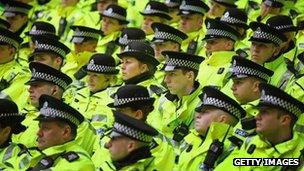Police and fire service reform will lead to job cuts, says MacAskill
- Published

The legislative move would see a single police force in place by April next year
Scotland's Justice Secretary Kenny MacAskill has admitted that police and fire service reforms will lead to job losses, but he refused to say how many.
The SNP minister was speaking after MSPs agreed that the country should have one police and one fire service.
Mr MacAskill told the Â鶹ԼÅÄ the change would result in backroom staff going, but the exact numbers would be decided by the new bosses of the services.
Trade union chiefs believe about 3,000 jobs could go in the shake-up
The <link> <caption>Police and Fire Reform Bill</caption> <url href="http://www.scottish.parliament.uk/parliamentarybusiness/Bills/45701.aspx" platform="highweb"/> </link> made it over its final hurdle at the Scottish Parliament on Wednesday.
The changes will see the eight separate police services, along with the Scottish Police Services Authority (SPSA) and the Scottish Crime and Drugs Enforcement Agency (SCDEA), merging to produce a single police force.
The eight separate fire services will also be amalgamated to produce a single fire and rescue service.
The new set up is due to be up and running by April next year and promises to save an overall £1.7bn over 15 years.
Kenny MacAskill: "By changing to a single service we reduce the duplication - yes there will be job losses, I cannot guarantee a job to eight chief constables, there will only be one."
Mr MacAskill had emphasised that the reform would not hit frontline services and there was also a guarantee of no compulsory redundancies.
However, he admitted backroom support jobs would have to go.
Speaking to Â鶹ԼÅÄ Scotland's Good Morning Scotland programme: "If we don't make changes what will play out in Scotland is the same situation which is playing out south of the border where 16,000 frontline police officers are being lost in England and Wales alone, according to the inspector of constabulary there.
"This government will not relinquish the belief that a visible police presence is one of the main reasons that we have got a 37-year low in recorded crime."
He added: "By changing to a single service we reduce the duplication - yes there will be job losses, I cannot guarantee a job to eight chief constables, there will only be one.
"Equally, we cannot have eight human resources department, eight PR departments, eight communication departments. We give a guarantee of no compulsory redundancies but it is ultimately for the new chief constable."
Opposition mergers
President of the Association of Chief Police Officers in Scotland, Chief Constable Kevin Smith, is leading the reform of the police service. He said the challenges ahead would be tough ones.
Mr Smith explained: "Our desire is to minimise the impact on our people, but the harsh reality of the budget and the harsh reality of the savings is that it will mean less people and that will be less support staff because there is clearly a focus on maintaining frontline operational officers to deliver the level of performance that we are delivering and from that will come challenges."
Labour and the Tories have backed the proposals, however, they have raised concern over the loss of civilian staff and whether the mergers would deliver the projected savings.
Lib Dem justice spokeswoman Alison McInnes, whose party did not back the mergers, said that of the 125 opposition amendments put forward to the bill, the majority SNP government accepted five "minor" ones.
Trade union Unison claimed the police service merger would create a "lack of local democratic accountability" and could lead to the loss of up to 3,000 police staff roles.
- Published27 June 2012
- Published2 May 2012
- Published1 May 2012
- Published21 February 2012
- Published1 September 2011
- Published29 April 2011